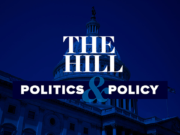We want the government to be transparent, but we also want Americans to have privacy. When people and government intersect — in the voting booth, in campaigns, in issue speech — which should prevail: transparency or privacy?
Missouri Governor Eric Greitens believes that individuals should be able to support causes they believe in privately. Missourians who donate to nonprofit groups such as the National Rifle Association, he says, should not be forced to have their name, address, occupation and employer appear in a public and searchable government database.
To illustrate that privacy is nothing new in politics, Greitens pointed out that we vote in private booths. We don’t call that “dark voting” — but some people do smear nonprofit privacy as “dark money” that ought to be banned.
To be sure, the vast majority (consistently over 95 percent) of spending on campaigns and candidate-related speech comes from groups that must disclose their donors. Both federal and state law require candidates, political parties, political action committees and super PACs to report the identities of their supporters.
These laws are intended to guard against corruption and increase confidence in government, but decades of experimentation by the states have produced littleevidence to that effect. And as Governor Greitens highlighted, disclosure has costs which can’t be ignored.
For grass-roots and volunteer-run groups, the compliance burdens resulting from disclosure laws can be crushing. For donors to groups of any kind, the risk of harassment or public shaming from having your private information published can make you think twice before contributing.
Powerful politicians like New York Senator Chuck Schumer see the “deterrent effect” of disclosure as a good thing. Missouri Senator Claire McCaskill has said that voters should simply ignore any message that isn’t endorsed by politicians themselves. But most of us want to protect the government’s critics, not silence them. Allowing people to privately support causes is just common sense.
Governor Greitens was immediately pilloried by Democrats in the Missouri Senate for suggesting that disclosure has limits and privacy has value. They failed to understand his point.
“The governor is wrong to malign transparency and disclosure,” said Senator Scott Sifton. “The people have a right to know who is paying for campaigns.”
With a little reflection, Greitens’ opponents might realize that they are the ones taking a radical position. Nowhere did the governor suggest that candidates or party committees should not report their contributors. His concern is that today’s disclosure proponents have lost all sense of proportion.
“The people who believe in voter intimidation believe that the minute you make a political donation, you immediately need to turn all your information over to the government, that you need to turn over your home address and your contact information, so that the government can turn around and publish that,” Greitens said on the Mark Reardon radio show.
This is not a condemnation of disclosure, but a call for moderation and perspective. Disclosure should not be so burdensome that groups stay silent to avoid the headaches of compliance. People who are sensitive about revealing their personal information to their family members, co-workers, children’s teachers, and nosy neighbors should not be shut out of the discussion altogether. If they fear associating with candidates, parties or political committees, how are they to be heard?
Keeping at least one avenue open for citizens to privately exercise their First Amendment rights to speech, assembly and petition is essential. That’s something the Supreme Court has long recognized. The landmark case NAACP v. Alabama shielded the privacy of nonprofits and asserted that “it is hardly a novel perception that compelled disclosure of affiliation with groups engaged in advocacy may constitute as effective a restraint on freedom of association as [other] forms of governmental action.”
Governor Greitens should be commended for bucking the trend of politicians, like Schumer and McCaskill, who attempt to silence their critics. In supporting privacy and free speech, the governor protects both his supporters and detractors from retaliation.
Policymakers should seek balance between transparency and privacy. We have a right to know what our government is doing, but the government has no right to monitor our political affiliations or beliefs. Requiring candidates and parties to disclose their donors, while protecting privacy for nonprofit advocacy groups, is a compromise everyone should get behind.
This post originally ran in Springfield News-Leader on June 18th 2017.














